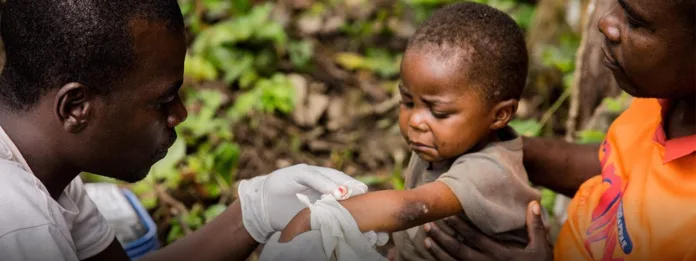Despite a low risk to the UK, health officials are implementing rapid testing and care protocols in response to the WHO’s global emergency declaration for the new mpox strain
The United Kingdom is ramping up its preparedness measures for mpox following the World Health Organization’s declaration of a global emergency over a new strain of the virus. This strain, identified as clade 1b, was first detected in the Democratic Republic of the Congo last year and has now prompted international concern due to its rapid spread.
The UK Health Security Agency (UKHSA) has confirmed that no cases of clade 1b have been reported within the UK to date. Dr. Meera Chand, a deputy director at the UKHSA, emphasized that while the current risk to the UK population remains low, the agency is proactively preparing for any potential cases. The preparation includes ensuring healthcare providers are equipped to identify and manage cases quickly, establishing rapid testing facilities, and developing protocols for the safe treatment of patients and prevention of further spread.
Mpox, formerly known as monkeypox, is transmitted through close physical contact and is characterized by flu-like symptoms and distinctive pus-filled lesions. Although the disease is generally mild, it can lead to severe complications and, in rare cases, death. Children, pregnant women, and individuals with compromised immune systems are particularly vulnerable to severe outcomes.
Dr. Tedros Adhanom Ghebreyesus, the WHO Director-General, announced the global emergency status for the mpox outbreak under the International Health Regulations (2005). This declaration, made on Wednesday, follows a previous public health emergency declaration in July 2022, which was lifted in May 2023 as global case numbers declined.
The new clade 1b strain has been identified in several countries that had not previously reported mpox cases, including Burundi, Kenya, Rwanda, and Uganda. This emergence has raised alarms about the virus’s potential to spread more widely and impact regions outside its previously endemic areas.
In the UK, the mpox situation had stabilized after a significant outbreak in the summer of 2022, which predominantly affected men who have sex with men. A vaccination program was launched in response to this outbreak and concluded in July 2023. By the end of 2022, the UK had reported 3,732 confirmed and probable mpox cases. In 2023 and up to July 31, 2024, there were 286 cases, with 269 in England. Of these, 116 patients were believed to have contracted the virus within the UK, while 82 were linked to travel outside the country.
Health officials continue to monitor the situation closely, coordinating with international health bodies to manage and mitigate the risk of mpox. The focus remains on strengthening surveillance, enhancing testing capabilities, and ensuring that health systems are prepared to handle any future cases of this evolving virus.
Analysis:
Political:
The UK’s proactive measures against mpox reflect a broader trend in international health policy, where governments are increasingly expected to respond swiftly to emerging health threats. The WHO’s global emergency declaration has significant political implications, as it necessitates coordinated international efforts and resources. The UK’s readiness and response will likely be scrutinized as a model for other countries facing similar threats, impacting domestic and international health policy discussions.
Social:
The resurgence of mpox and the emergence of a new strain highlight ongoing social concerns about public health preparedness and response. The virus’s impact on vulnerable populations, including children and those with weakened immune systems, underscores the need for comprehensive healthcare strategies. Public awareness and education campaigns will be crucial in addressing potential misconceptions and ensuring that individuals are informed about the risks and preventive measures associated with mpox.
Racial:
The identification of the clade 1b strain in several African countries draws attention to the disparities in global health surveillance and response. Historically, outbreaks of diseases originating in Africa have faced delays in international response and support. The current situation emphasizes the need for equitable global health strategies that prioritize early detection and intervention in all regions, regardless of their economic status.
Gender:
The previous outbreak of mpox in the UK predominantly affected men who have sex with men, highlighting gender and sexual orientation considerations in public health responses. The new outbreak may necessitate tailored health communication strategies to address specific communities and ensure that preventative measures and treatments are accessible to all affected groups.
Economic:
The economic implications of an mpox outbreak include potential costs related to healthcare, testing, and vaccination efforts. While the current risk in the UK is low, ongoing preparedness measures involve financial investments in public health infrastructure and resources. The economic impact of managing an outbreak can strain healthcare systems and budgets, particularly if widespread transmission occurs. The focus on rapid testing and care protocols is intended to mitigate these costs by preventing larger-scale outbreaks.
